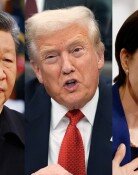[Opinion] George Kennan
On February 22, 1946, a telegram from the U.S. Embassy in the Soviet Union shook up Washington. The writer of this Long Telegram theorized the containment policy against the Soviet for the first time. He is George Kennan. At the time, he was an ordinary 42-year-old diplomat working as a part of the policy planning staff for the State Department. Tensions were mounting between the United States and the Soviet Union after the end of World War Ⅱ. Introduced in such an atmosphere, Kennans theory was palatable to U.S. decision-makers. In March of the following year, the containment policy was molded into the Truman Doctrine.
Kennan developed the Long Telegram into the X article, and published it in the foreign policy magazine, Foreign Affairs (July issue, 1947). This article became a fundamental guide for U.S. foreign policies makers during the Cold War. Later, Henry Kissinger commented, it was unprecedented for an embassy report to have such a huge impact on Washingtons perception of the world.
It is probably the dream of every scholar and politician to have his or her theory receive such attention and be such a huge influence on the world. As the post-Cold War era arrived in the 1990s, a few scholars made an attempt to play the same role Kennan played in the 1940s with his X article. Samuel Huntington author of The Clash of Civilizations and Zbigniew Brezinski author of A Geostrategy for Eurasia are two examples.
The containment policy was an effective countermeasure to block the Soviet Unions expansionist policy of communism. However, it inevitably had its share of criticism. It has been criticized for assuming that it was meaningless to have dialogue and negotiations with the Soviet Union, and for contributing to justifying the U.S.s indiscriminate intervention. In that sense, todays Neo-Cons, who engage in unilateral behavior based on their military superiority, could be viewed to have been, in some part, influenced by Kennan.
Kennan celebrated his 100th birthday a few days ago. When optimism was filling the air after the post-Cold War, he asserted, it is not advisable for the U.S. to politically or militarily intervene in every matter of every country (Foreign Affairs, March/April issue, 1995). However, the United States is extending its influence to all corners of the world from Afghanistan to Iraq to North Korea after the 9/11 terrorist attacks. One has to wonder how Kennan is viewing todays situation.
Editorial Writer Song Moon-hong, songmh@donga.com






![매일 풀업 60개씩 하는 75세 회장님… “허리 통증도 없어져”[양종구의 100세 시대 건강법]](https://dimg.donga.com/c/138/175/90/1/wps/NEWS/IMAGE/2025/12/13/132956597.1.jpg)
